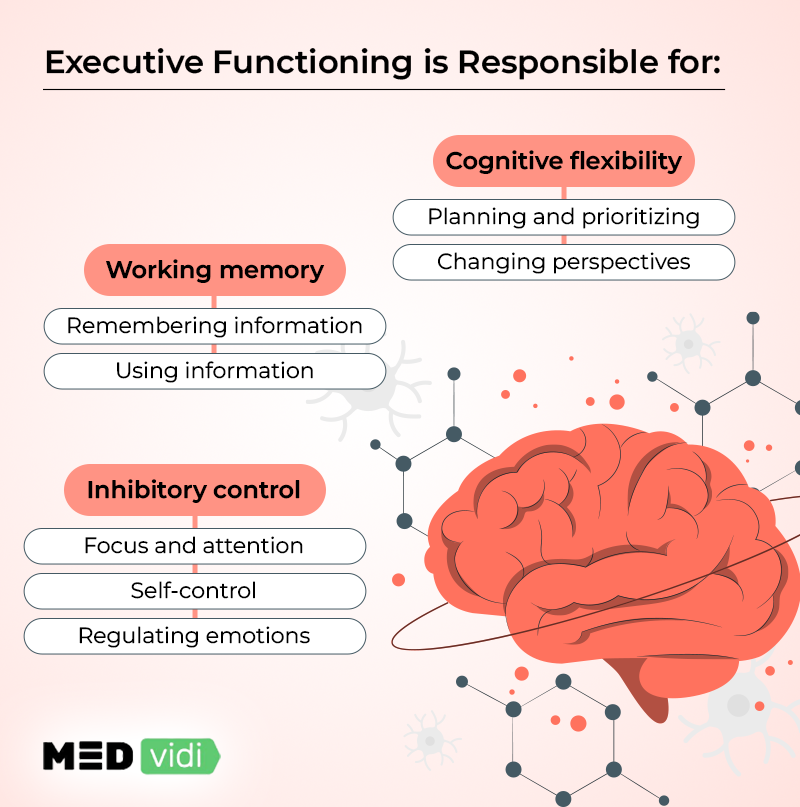The process of thinking, acting, and feeling is controlled by executive functioning. It determines a person’s ability to manage their time, plan activities, and regulate their behavior and emotions.
Executive functioning skills are required for setting priorities, recalling information, paying attention, concentrating, and more. They also aid in understanding how current behaviors will affect the future positively or negatively, which results in self-censoring—avoiding doing or saying the wrong thing when necessary.
Those diagnosed with ADHD can notice their executive functioning skills becoming worse. In this post, we’ll examine the connection between the issues with executive functioning and ADHD, the symptoms of executive function disorder, and available treatments.
Symptoms of Executive Dysfunction
Executive dysfunction is not an official diagnosis. It is a name for specific symptoms usually
In many facets of life,
1. Memory problems
It has been
2. Challenges with time management, planning, and organization
To complete everything that must be done, we must plan projects, gather the necessary resources, and work on the tasks consistently to finish them within an acceptable time. Executive dysfunction could obstruct the entire procedure and come with difficulty in finishing up long-term projects.
People who need help with this aspect of executive functioning have trouble organizing their materials, separating important information from irrelevant data, anticipating and making plans for future events, calculating how long tasks will take to complete, and even just starting a task.
3. Difficulties with concentration and paying attention
When a person has executive dysfunction, it may be difficult for them to maintain constant focus on a task. Even when trying to focus on one specific thing, they may switch between the activities and end up doing another task. Moreover, they might not even realize how that could happen.
Deficits in executive functioning make people easily distracted and prone to missing crucial information. In addition to external factors, they are preoccupied with their thinking. Moreover, when attention needs to be diverted, they struggle to do so, and they are prone to becoming fixated on one idea and thinking only about it.
4. Lack of inhibitory control
Intentionally limiting attention and instinctive reactions to anything is known as inhibitive control or IC. Examples of this practice include ignoring distractors, stopping oneself from speaking out loud, or restraining a compulsive response. Executive function issues might contribute to difficulty in regulating emotions and behavior. That is why people who struggle with executive dysfunction may present as easily distracted, impulsive, and stimulus-driven.
You can find out if you have any symptoms through an online ADHD screening for adults and get help from a healthcare professional online at MEDvidi.
What is the Best Way to Treat Executive Dysfunction?
Improving the executive function skills that are thought to be lacking is the main objective. Therefore, the treatment plan is always personalized and focuses on managing and solving particular issues that may vary in different patients.
The procedure of developing the treatment plan is based on both the root of the dysfunction and the areas that need the most improvement. Adults with executive dysfunction, including issues with inhibition, emotion regulation, time management, and planning, respond particularly well to cognitive-behavioral therapy when combined with
- Work in a step-by-step manner or divide projects into smaller ones.
- Utilize time management tools and apps.
- Create visual schedules, mark the necessary project milestones, and review those charts several times daily.
- When feasible, ask for written instructions in addition to spoken ones.
- Plan and organize activity shifts and times of changeover.
Consult a mental health expert online to know if you have ADHD and get a personalized treatment plan.

Conclusion
Difficulties with executive function and ADHD are often closely related. Executive function issues can arise for various reasons, not simply ADHD, but they can be managed.
To overcome your mental challenges, consider seeing a professional. MEDvidi experts can assist you in managing your symptoms so that you can live a healthier and happier life.












